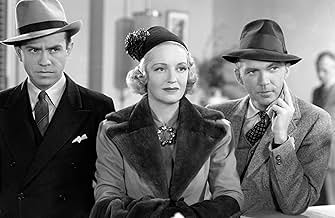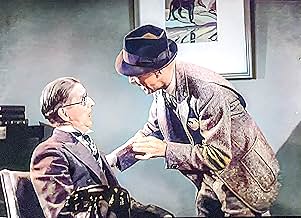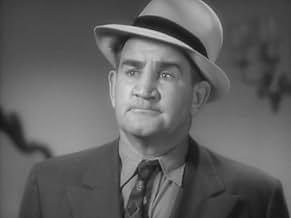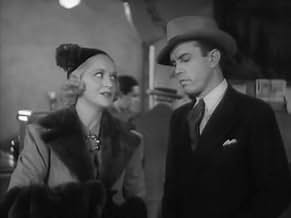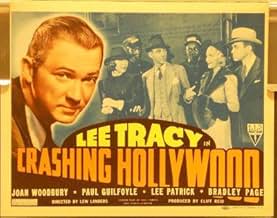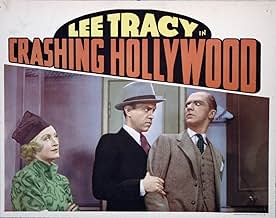An ex-con, just out of prison, and his wife meet a screen writer on the train and decide that, since he's writing about crime without knowing much about it, collaborating with him would be b... Read allAn ex-con, just out of prison, and his wife meet a screen writer on the train and decide that, since he's writing about crime without knowing much about it, collaborating with him would be better than starting a duck farm. Things get a bit sticky when the real gangsters show up a... Read allAn ex-con, just out of prison, and his wife meet a screen writer on the train and decide that, since he's writing about crime without knowing much about it, collaborating with him would be better than starting a duck farm. Things get a bit sticky when the real gangsters show up and want to know how Hollywood knows so much about them.
- Crisby
- (as James Conlin)
- Train Porter
- (uncredited)
- The Hawk Auditioner
- (uncredited)
- Butler
- (uncredited)
- Detective Barging Into Makeup Room
- (uncredited)
- Mrs. Armstrong
- (uncredited)
- Barbara's Landlady
- (uncredited)
Featured reviews
** 1/2 (out of 4)
A former gangster (Paul Guilfoyle) gets out of prison and takes his wife on a train to California where he plans on going straight by starting a duck farm. On the train he meets a screenwriter (Lee Tracy) and the two team up to make realistic crime pictures. All goes well until a real gangster shows up wondering how the writers is getting all the details right. This film isn't nearly as funny as it should have been but it is mildly entertaining on a second film of a double feature type of way. For the most part this is just a one-joke film as our main guys make a blockbuster movie but soon the main gangster is showing up to get revenge. This leads to some rather routine gags including the gangster being mistaken for the actor playing him as well as the actor getting beaten up because people thinks he's the gangster. These scenes here are actually pretty funny but they only come up during the final fifteen-minutes. These final scenes contain the most laughs as the police are running around the studio trying to capture the real bad guys. Tracy is pretty good in his role but you have to like his style of comedy or else you'll probably find him annoying. Guilfoyle is also pretty good but he's a character actor I've always enjoyed. It's Richard Lane who steals the film as the loud mouth, fast talking producer who's always trying to sign someone to a contract. Lane would become famous for playing Inspector Farraday in the Boston Blackie movies and his comic timing here is just as good. Fans of those Boston Blackie movies will certainly get a kick out of seeing Lane here.
Guilfoyle's material is based on his time with the gang of the infamous criminal known as The Hawk still at large and still unknown to the public. But he does look a whole lot like ham actor Bradley Page.
Crashing Hollywood is based on a flop play Lights Out which only ran 12 performances in 1922. Back in the day studios bought all kinds of material even stuff that flopped on stage because they needed dialog for those new fangled talking pictures. In this case there was a silent version which seems to have disappeared into obscurity.
Dwarfed by the much larger budgeted Boy Meets Girl over at Warner Brothers also about zany studio goings on, Crashing Hollywood does have its moments. Bradley Page is great in the dual role of the Hawk and the ham. Tom Kennedy is always funny and here's the Hawk's thick as a brick trigger man. Richard Lane however steals the show as the zany head of the studio, Wonder Pictures where Lucille Ball would work in The Affairs Of Annabel.
Tracy is good, but almost subdued here for him. Crashing Hollywood will be enjoyed by fans who liked Boy Meets Girl like me.
There are many plot lines to this movie. Winslow is trying to get in good with Barbara Lang (Joan Woodbury), who wants to be an actress. Mike wants to write movie scripts for Wonder Studios. Herman and Tibbits want to go straight and work with Winslow. In fact, it is Herman who knows how to be a real robber and that is what helps Winslow write very effective movie scripts. Turns out they are too effective as they are based on Herman's life before prison and that makes the attention of The Hawk (the head of the gang that Herman had been part of) who the movies are about.
It is all of that coming together that makes this such an interesting movie. The movie keeps up a steady, increasing pace throughout. The dialogue is crisp and well written. The start of the movie lays out a very solid foundation. The middle builds the pace and the ending has a lot of action. It is amazing that a 65 minute movie has so much in it and yet doesn't leave you wondering what got missed (nothing does). 9/10
I love it when the chases around the studio lot crash through the movie sets-- poor Jack Carson (the director) never will complete a shot. Plus we've got two of Hollywood's fastest talkers—Lane and Tracy. In fact, Lane steals the show as a don't-mess-with-me studio boss. I wonder if any of RKO's suits got a message. Actually, Tracy's more subdued than his usual fast-talking reporter, but still fits in well. It's also a good chance to catch some of the studio grounds and soundstages that are nicely blended into the proceedings. No, the movie's nothing special. But it does show again how delightfully entertaining these old programmers can be.
Did you know
- TriviaThe original play opened in New York City, New York, USA at the Vanderbilt Theatre, 148 W. 48th St. on 17 August 1922, but closed after only 12 performances.
- Quotes
Michael Winslow: I beg your pardon, but I'm really awfully sorry about this afternoon. It was my own stupid...
Barbara Lang: It's quite all right.
Michael Winslow: You don't like me.
Barbara Lang: I don't see what difference that makes.
Michael Winslow: You know, I'm the kind of a fellow, when you first meet me you don't like me. But after you get to know me better... you hate me.
Barbara Lang: Oh, I'll never hate you.
Michael Winslow: Well, that's something.
Barbara Lang: Because I'm *not* going to know you any better.
- ConnectionsReferences Capitaines courageux (1937)
Details
- Runtime
- 1h 1m(61 min)
- Color
- Aspect ratio
- 1.37 : 1

